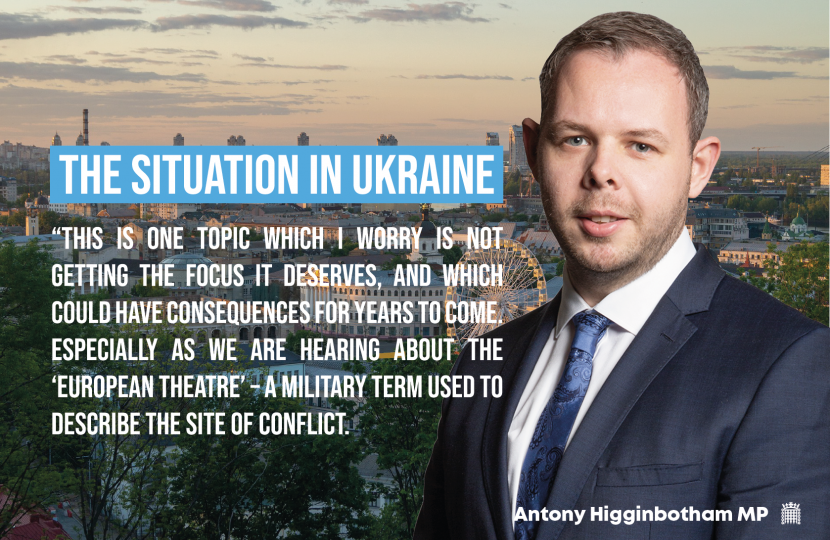
It’s always a difficult task choosing what to write in this column, with more than enough going on every week to fill it multiple times. From events in Parliament and national policy changes, through to what the big topic are in the media, or local issues. This week is no different.
But there is one topic which I worry is not getting the focus it deserves, and which could have consequences for years to come – the situation in Ukraine.
For the first time in decades we are hearing about the ‘European theatre’ – a military term used to describe the site of conflict.
Ever since Russia illegally annexed the Crimea in March 2014, just weeks after the Sochi Winter Olympics, Ukraine has existed in a state of war. According to the Ukrainian Government, more than 14,000 have died in that conflict since; a conflict that has not always had the media prominence it should have. In recent weeks this has only got worse. Russia has now amassed a force of more than 100,000 armed forces personnel on the border of Ukraine.
Whilst there is a tendency, and sometimes a wish, to think of these places as far off lands, that is sadly not the case. Ukraine itself is less than 1,500 miles away and for our NATO alliance partners like Estonia and Lithuania, whom we are sworn to defend, the threat can be measured in single digits.
President Putin of Russia has tried to frame this as an issue of Russian self-defence; worried about NATO on its borders it is acting as any stable country would. But we know that to be untrue. NATO shares only about 16% of Russia’s border, has never sought to move massive numbers of troops to the border (the UK, for example, has only around 800 troops in Estonia), and is purely defensive. Article 5 of the alliance says an attack on one is an attack on all – it couldn’t be clearer about being defensive in nature.
And if anyone is in any doubt they need only look at the essay penned by President Putin himself in July last year titled “On the Historical Unity of Russians and Ukrainians”. In the article Putin espouses a sense of nationalism which would at best see Ukraine headed by a puppet under Kremlin control, and at worse unify the country into Russia entirely. This nationalism has been used in Europe before and it should concern us all that it is rearing its head once again.
We should be clear about the ramifications for us, and for Europe if this course of action being pursued by Putin and his allies in the Kremlin is allowed to go unchallenged. It will mean that we go back to a world where brute force is considered an accepted means of changing borders. That a sovereign country is only sovereign for as long as a bigger neighbour considers it acceptable.
It will bring instability and hostility back to the continent of Europe, with a regime in the Kremlin that is emboldened to act. And it will bring mass loss of life in Ukraine and Russia.
The challenge now facing us is one of brinkmanship. The Russians evidently see the situation like a game of poker, with each side playing its hand publicly whilst reserving some cards for the future. The risk of miscalculation in such a scenario is huge.
The Secretary of State for Defence, the Foreign Secretary and the Prime Minister have been working tirelessly behind the scenes to bring NATO allies together under one banner. Those efforts are paying dividends with the PM announcing to the House of Commons this week that a raft of severe sanctions have now been drawn up which could be activated quickly if needed.
But further action will be needed, and we cannot afford for the West to lose focus on this issue.

